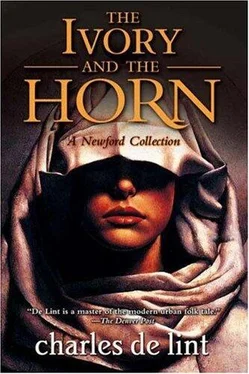So I did the best I could. At recess, I'd stand miserably on the sidelines, trying to look as though I was a part of the linked fence, or whatever I was standing beside at the time, because I soon learned it was better to be ignored than to be noticed and ridiculed. I stuck it out until just before Christmas break. I don't know if I would have been able to force myself to return after the holidays, but that day a bunch of boys were teasing me and my eyes were already welling with tears when Gina walked up out of nowhere and chased them off.
"Why don't you ever play with anybody?" she asked me.
"Nobody wants me to play with them," I said.
"Well, I do," she said and then she smiled at me, a smile so bright that it dried up all my tears.
After that, we were best friends forever.
5
Gina was the most outrageous, talented, wonderful person I had ever met. I was the sort of child who usually reacted to stimuli, Gina created them. She made up games, she made up stories, she made up songs, It was impossible to be bored in her company, and we became inseparable, in school and out.
I don't think a day went by that we didn't spend some part of it together. We had sleepovers. We took art and music and dance classes together, and if she won the prizes, I didn't mind, because she was my friend and I could only be proud of her. There was no limit to her imagination, but that was fine by me, too. I was happy to have been welcomed into her world, and I was more than willing to take up whatever enterprise she might propose.
I remember one afternoon we sat up in her room and made little people out of found objects: acorn heads, seed eyes, twig bodies. We made clothes for them and furniture and concocted long, extravagant family histories so that we ended up knowing more about them than we did our classmates.
"They're real now," I remember her telling me. "We've given them lives, so they'll always be real."
"What kind of real?" I asked, feeling a little confused because I was at that age when I was starting to understand the difference between what was make believe and what was actual.
"There's only one kind of real," Gina told me. "The trouble is, not everybody can see it and they make fun of those who can."
Though I couldn't know the world through the same perspective as Gina had, there was one thing I did know. "I would never make fun of you," I said.
"I know, Sue. That's why we're friends."
I still have the little twig people I made, wrapped up in tissue and stored away in a box of childhood treasures; don't know what ever happened to Gina's.
We had five years together, but then her parents moved out of town— not impossibly far, but far enough to make our getting together a major effort, and we rarely saw each other more than few times a year after that. It was mainly Gina's doing that we didn't entirely lose touch with each other. She wrote me two or three times a week, long chatty letters about what she'd been reading, films she'd seen, people she'd met, her hopes of becoming a professional musician after she finished high school. The letters were decorated with fanciful illustrations of their contents and sometimes included miniature envelopes in which I would find letters from her twig people to mine.
Although I tried to keep up my side, I wasn't much of a correspondent. Usually I'd phone her, but my calls grew further and further apart as the months went by. I never stopped considering her as a friend— the occasions when we did get together were among my best memories of being a teenager— but my own life had changed, and I didn't have as much time for her anymore. It was hard to maintain a long-distance relationship when there was so much going on around me at home. I was no longer the new kid at school, and I'd made other friends. I worked on the school paper, and then I got a boyfriend.
Gina never wanted to talk about him. I suppose she thought of it was a kind of betrayal; she never again had a friend that she was as close to as she'd been with me.
I remember her mother calling me once, worried because Gina seemed to be sinking into a reclusive depression. I did my best to be there for her. I called her almost every night for a month, and went out to visit her on the weekends, but somehow I just couldn't relate to her pain. Gina had always seemed so self-contained, so perfect, that it was hard imagine her being as withdrawn and unhappy her mother seemed to think she was. She put on such a good face to me that eventually the worries I'd had faded and the demands of my own life pulled me away again.
6
Gina never liked Christmas.
The year she introduced me to Newford's gargoyles we saw each other twice over the holidays: once so that she could do her Christmas shopping, and then again between Christmas and New Year's when I came over to her place and stayed the night. She introduced me to her dog— Fritzie, a gangly, wirehaired, long-legged mutt that she'd found abandoned on-one of the country roads near her parents' place— and played some of her new songs for me, accompanying herself on guitar.
The music had a dronal quality that seemed at odds with her clear high voice and the strange Middle Eastern decorations she used. The lyrics were strange and dark, leaving me with a sensation that was not so much unpleasant as uncomfortable, and I could understand why she'd been having so much trouble getting gigs. It wasn't just that she was so young and since most clubs served alcohol, their owners couldn't hire an underage performer; Gina's music simply wasn't what most people would think of as entertainment. Her songs went beyond introspection. They took the listener to that dark place that sits inside each and every one of us, that place we don't want to visit, that we don't even want to admit is there.
But the songs aside, there didn't seem to be any trace of the depression that had worried her mother so much the previous autumn. She appeared to be her old self, the Gina I remembered: opinionated and witty, full of life and laughter even while explaining to me what bothered her so much about the holiday season.
"I love the idea of Christmas," she said. "It's the hypocrisy of the season that I dislike. One time out of the year, people do what they can for the homeless, help stock the food banks, contribute to snowsuit funds and give toys to poor children. But where are they the rest of the year when their help is just as necessary? It makes me a little sick to think of all the money that gets spent on Christmas lights and parties and presents that people don't even really want in the first place. If we took all that money and gave it to the people who need it simply to survive, instead of throwing it away on ourselves, we could probably solve most of the problems of poverty and homelessness over one Christmas season."
"I suppose," I said. "But at least Christmas brings people closer together. I guess what we have to do is build on that." Gina gave me a sad smile. "Who does it bring closer together?"
"Well... families, friends..."
"But what about those who don't have either? They look at all this closeness you're talking about, and it just makes their own situation seem all the more desperate. It's hardly surprising that the holiday season has the highest suicide rate of any time of the year."
"But what can we do?" I said. "We can't just turn our backs and pretend there's no such thing as Christmas."
Gina shrugged, then gave me a sudden grin. "We could become Christmas commandos. You know," she added at my blank look. "We'd strike from within. First we'd convince our own families to give it up and then..."
With that she launched into a plan of action that would be as improbable in its execution as it was entertaining in its explanation. She never did get her family to give up Christmas, and I have to admit I didn't try very hard with mine, but the next year I did go visit the residents of places like St. Vincent's Home for the Aged, and I worked in the Grasso Street soup kitchen with Gina on Christmas day. I came away with a better experience of what Christmas was all about than I'd ever had at home.
Читать дальше












